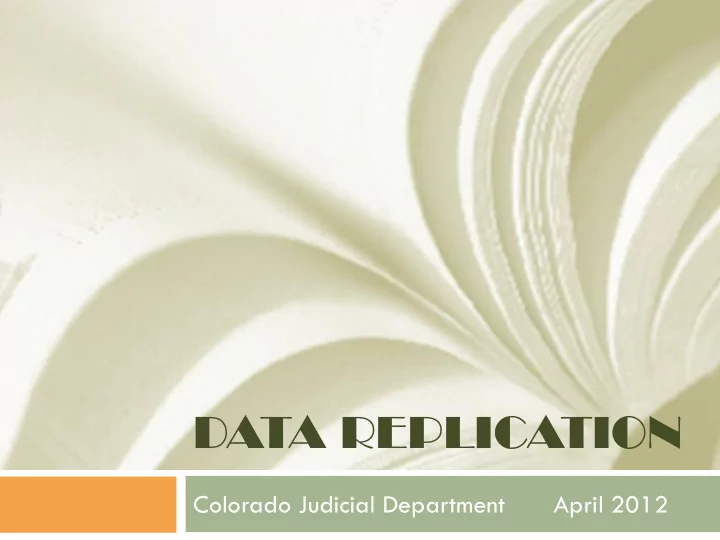

DATA REPLICATION Colorado Judicial Department April 2012
Introduction Judicial Department Requested to review data replication release policy Task Force commissioned in August 2011 Task Force Charge Research original policy reasoning and technology Review current policy; including release policies of other government agencies Consider if current access meets policy objectives Provide Recommendations to the Public Access Committee regarding this policy area
History First data releases (in early 1990s) included entire trial court database In an effort to address concerns related to confidential and incorrect (stale) information being available on the Internet, data releases were modified Public Access Policy was created that more clearly defined files and fields that Judicial could release
Technology limitations made compiled data releases to be time consuming and difficult Time and financial constraints led Judicial to obtain an agent to create more suitable data access First agent provided public access to court records on case-by-case or name search basis Also provided a replicated database to other vendors Some data display issues continued related to outdated information remaining available on the Internet
Contract expiration caused second agent to be selected Different data release requirements established All access was on name by name or case by case basis (data replication discontinued) Colorado provides aggregate and composite data releases
CO State Government Data Access Agencies provide limited data sets to the public Significant data sharing occurs among agencies governed by a Data Advisory Board No agencies were identified that currently provide a replicated database consisting of all of the agency’s public records
Other States’ Judicial Record Access Researched surrounding comparable states Some states experimented with database releases Most states did not find this to be a satisfactory data access solution
Current Colorado Data Access XML access for vendors to provide live data access to customers Direct case-by-case or name-by-name searches can only be done by approved government agencies Composite and Aggregate data requests
Replication Advantages Potential performance improvements No down time if connectivity is interrupted (network or systemic) Different search indexing may be done to facilitate quicker search result returns
Replication Disadvantages Once released a database is in control of the recipient Data can be displayed or manipulated in any fashion Data can be copied and resold Inaccurate results because of complicated relational database structure Database would have to be replicated to all persons or entities that request it Financial and resource impact to Judicial (training, audits, etc.)
Technology Technology options were researched and considered Industry standards are moving away from replication and duplicative databases in favor of web services Technology changes constantly and is continually improving and providing new and innovative solutions
Task Force Recommendations Current access to electronic court data is appropriate and sufficient Data and information from a replicated database cannot be sufficiently protected Accuracy of data displays could not be sufficiently monitored Data replication is not a common practice with other Colorado government agencies It is premature to change the policy at this time but department should continue to research technology opportunities that may enhance performance of the current system
Recommend
More recommend